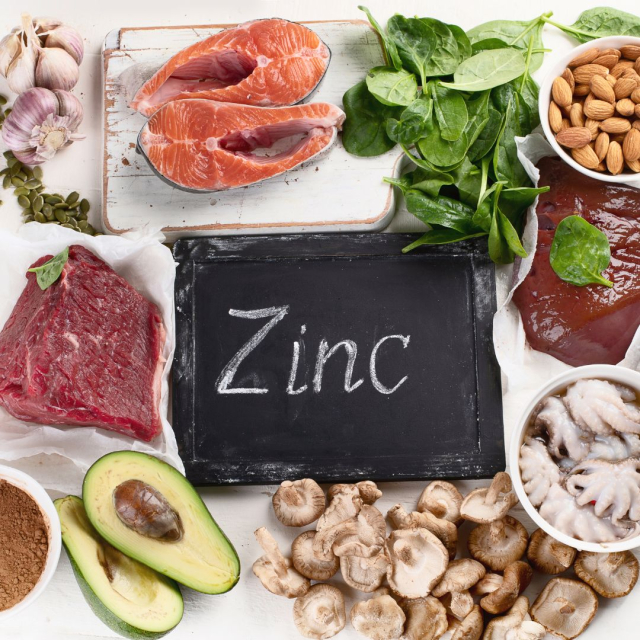Zinc is an essential mineral that plays numerous vital roles in the human body. Often overlooked compared to other nutrients, zinc plays a crucial role in maintaining overall health and well-being.
What is Zinc and why is it important?
Zinc is a trace element found in every cell in the body and is necessary for the activity of more than 300 enzymes that help digestion, metabolism and other important functions. Even though the human body contains only about 2-3 grams of zinc in total, its presence is essential for proper health.
Main Functions of Zinc in the Body
Immune Function : Zinc plays a crucial role in immune system function. It acts as an antioxidant and is necessary for the production and functioning of white blood cells, which help the body fight infections.
Growth and Development : It is essential during pregnancy, childhood and adolescence for normal growth and development. Contributes to proper cell development, division and growth.
Wound Healing: Zinc is necessary for protein synthesis and the wound healing process. Helps maintain the integrity of the skin and mucosal tissues.
Cognitive Function: Zinc has been shown to play a role in cognitive function and memory. It helps maintain brain health and may play a role in preventing neurodegenerative diseases.
Sense of Smell and Taste: Zinc is necessary for the senses of smell and taste. Zinc deficiency can negatively affect the ability to perceive and enjoy tastes and smells.
Detailed Benefits of Zinc
Not only is zinc crucial for basic body functions, but it has also been associated with a number of specific health benefits. Below are some of the most notable ones:
1. Support to the Immune System
Zinc is essential for proper immune system function. It plays a key role in the development and activation of immune cells, such as T lymphocytes and natural killer cells. Zinc deficiency can increase susceptibility to infections and prolong recovery time from common illnesses.
2. Reproductive Health
Zinc plays a crucial role in reproductive health in both men and women. In men, it is necessary for sperm production and fertility. In women, it contributes to hormonal regulation and the maintenance of a healthy menstrual cycle.
3. Heart Health
It has been suggested that zinc may play a role in cardiovascular health by helping to maintain healthy cholesterol levels and supporting endothelial function, which is crucial for blood vessel health.
4. Brain and Mental Function
Zinc is essential for normal cognitive function and may play a role in preventing neurodegenerative diseases such as Alzheimer's. It helps in the transmission of neural signals and the regulation of neurotransmission, which can influence mood and mental function.
5. Skin Support and Wound Healing
Zinc is essential for maintaining skin health and speeding up the wound healing process. It participates in the synthesis of collagen and other structural proteins that are essential for the integrity of the skin and the healing of damaged tissues.
6. Regulation of Metabolism
Zinc plays a crucial role in the metabolism of carbohydrates, fats and proteins. It participates in insulin regulation and helps maintain healthy blood sugar levels, which is crucial for preventing and managing type 2 diabetes.
7. Antioxidant Support
Acting as an antioxidant, zinc helps protect cells from oxidative damage caused by free radicals. This can have beneficial long-term health effects, including reducing the risk of chronic diseases such as cancer and heart disease.
8. Improved Sense of Smell and Taste
Zinc deficiency has been linked to loss of sense of smell and taste. Maintaining adequate zinc levels can help preserve these senses and improve quality of life.
Food Sources of Zinc
To maintain healthy levels of zinc, it is crucial to consume a balanced diet that includes rich sources of this mineral. Some foods that are good sources of zinc include:
Red meat: such as beef and lamb.
Seafood: such as oysters, crabs and prawns.
Poultry: such as chicken and turkey.
Dairy products: such as cheese and yogurt.
Legumes: such as beans, lentils and chickpeas.
Nuts and seeds: such as walnuts, almonds, and pumpkin seeds.
Who is at Risk for Zinc Deficiency?
Although zinc is found in a variety of foods, some people may be at higher risk of deficiency, including:
Vegetarians and vegans: who may have a reduced intake due to the exclusion of animal sources.
People with absorption problems: such as celiac disease or inflammatory bowel diseases.
Pregnant and lactating women: whose zinc needs increase during pregnancy and lactation.
Older people: who may have lower zinc absorption due to changes in the digestive system.
Zinc is an essential mineral with a variety of critical functions in the human body. From supporting the immune system to facilitating wound healing and improving cognitive function, the benefits of zinc are indispensable for maintaining overall health and well-being. It is important to ensure you get enough zinc through a balanced diet or supplementation when necessary to optimize long-term health.
